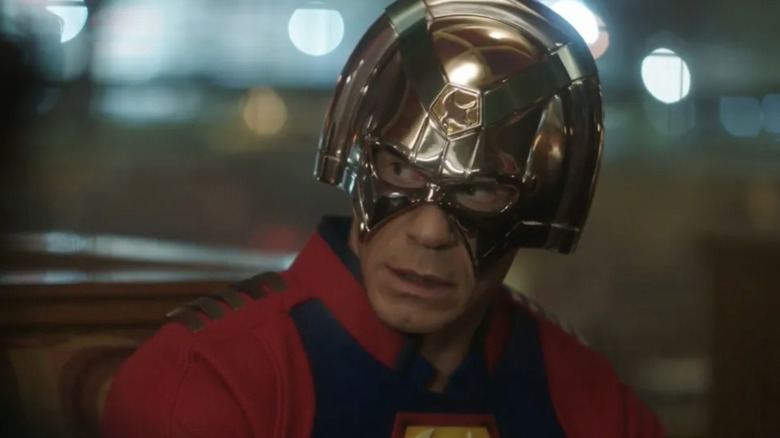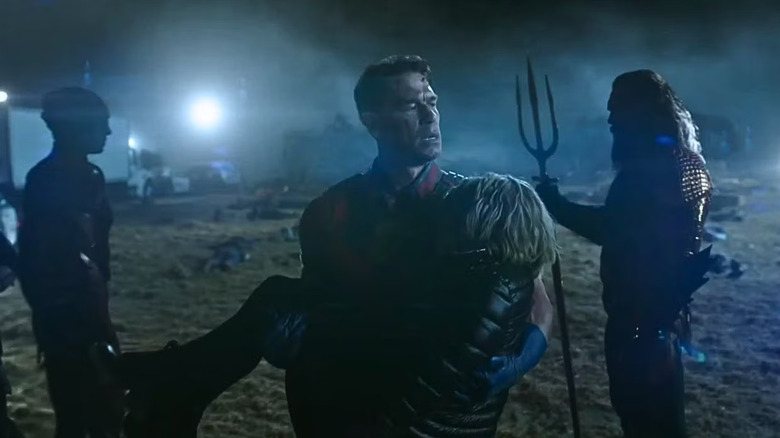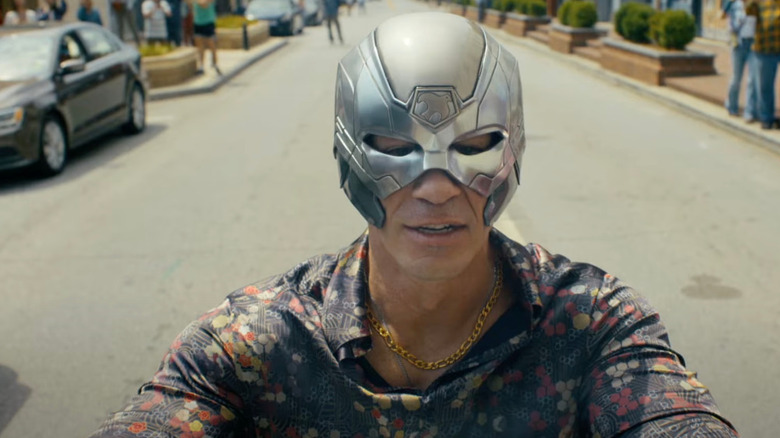Peacemaker Season 2's 'Previously On' Recap Rewrites The Show's Own History (And It Works)
Spoilers follow.
Continuity within a serialized narrative can be a double-edged sword. On the one hand, there's no more rewarding feeling to be watching a film or TV series and seeing a character or plot point referenced (or, even better, paid off) from several movies or seasons prior. It's confirmation that the filmmakers care enough about the series to have been paying close attention to it, and it's validation for the fan who feels like their time watching diligently over the years has been well spent. On the other hand, a series with tight continuity can feel intimidating, even alienating, for audiences not already inducted or in the know. And on the filmmaking side of the equation, having to abide by an increasingly long list of set-in-stone plot points, characters, and other rules can be creatively restricting.
This is why the medium of comic books — which feature arguably the longest-running narratives of any medium — came up with the concept of "jumping on points." Yes, comic continuity in the superhero titles of the Big Two publishers have undergone company-wide reboots several times. For DC Comics, these shifts have arrived in the form of several "Crisis on Infinite Earths" crossover stories, which use some cataclysmic event to reform and reset the universe going forward. For Marvel Comics, there have been several "Secret Wars" events that operate in a similar fashion. The Marvel Cinematic Universe, under the guiding hand of Kevin Feige, have told their stories on screen in a manner that closely resembles comic book continuity, and now they seem to be facing their own impending crisis, as "Avengers: Secret Wars" is due for release in 2027, and it's heavily rumored to be the film which resets the MCU.
Although James Gunn and Peter Safran's DC Studios is new, their first couple projects have demonstrated an interest in moving away from trying to keep a tight leash of continuity on the universe. The latest example of this shows up in the second season premiere of "Peacemaker." Where most TV shows returning for a new season have a "Previously On" segment which catches new and old viewers up to speed, this premiere features what might be a TV first: a moment from the first season that's been almost completely rewritten. It's a deft, bold choice on Gunn's part, and what's more, it works exceptionally well.
Exit the Justice League, enter the Justice Gang
Toward the end of the eighth and final episode of the first season of "Peacemaker" entitled "It's Cow or Never," Christopher Smith aka Peacemaker (John Cena) has taken his covert ops team known as Task Force X to attack Coverdale Ranch, which the invading alien species known as the Butterflies have made into their headquarters. In the process of stopping the Butterfly invasion, every member of the group end up injured or wounded, with Emilia Harcourt (Jennifer Holland) being the worst off. As Peacemaker carries Harcourt to safety upon the end of the conflict, the Justice League arrive, and not just any Justice League, but the one from the eponymous movies set in the DC Extended Universe. In addition to the shadowed figures of Superman and Wonder Woman, we see Aquaman (Jason Momoa) and The Flash (Ezra Miller) as Peacemaker angrily tells the League that they've arrived too late.
However, in the version of this moment shown during the recap of season 1 before the season 2 premiere, the Justice League are nowhere to be seen. Instead, the superheroes who arrive to Coverdale Ranch way too late are the Justice Gang, as established in Gunn's "Superman" this past July. Instead of Aquaman and The Flash sharing a bit of banter, it's Green Lantern/Guy Gardner (Nathan Fillion) and Hawkgirl/Kendra Saunders (Isabela Merced). Though there are a couple little other changes noticeable in the recap, it's this retcon which firmly transplants "Peacemaker" from the DCEU to the DCU. From there, the series continues in a manner which the recap promises, as if the show had always taken place in the DCU. For instance, one of the first scenes sees Chris going to audition to join the Justice Gang, and Gardner and Saunders are there along with their benefactor, Maxwell Lord (Sean Gunn). Frank Grillo portrays Rick Flag Sr. as the director of A.R.G.U.S., as he does in "Superman" and the animated "Creature Commandos." No reality-changing incursion, supervillain, time travel plot or other type of shenanigan or doohickey is needed to make this massive switch between universes. Instead, Gunn just goes ahead and does it, which feels like a breath of fresh air.
Gunn's approach to a unified narrative for the DCU is blissfully low-stakes
During the lead-up to the release of "Superman" and the beginning of the DCU proper, there've been numerous pieces speculating as to what and who is canon, how certain characters might move over from the DCEU to the DCU, and so on. There was also some speculation on how "Superman" itself might handle the introduction of a new Kal-El/Clark Kent (David Corenswet) along with a new cast of supporting heroes and villains. As it turned out, Gunn took a page from many "jumping on" comic books that have come before, which is to provide a few bits of background via some opening title cards and then jump straight into the story. "Superman" is aggressively not an origin story, as its opening titles stipulate that Superman has been an active hero for the last three years, and thus every major character in the film has either already met or already has a relationship with one another. In effect, the film feels like one step beyond Gunn's team movies like "Guardians of the Galaxy" and "The Suicide Squad," and even the first season of "Peacemaker." While those films effectively felt like origin stories thanks to a bunch of characters meeting each other and teaming up for the first time, "Superman" does away with the pretense.
It's a storytelling shorthand that feels as true to comic books as heavy-handed attempts at retcons do, but unlike the latter, the former approach is a uniquely fresh one to the big and small screens. Instead of feeling forced to do a "Star Trek" or "X-Men: Days of Future Past" thing, "Superman" and "Peacemaker" swiftly and succinctly tell both returning and new viewers the essentials of what they need to know and continue from there. This approach seems to be in direct opposition to where the MCU has found itself, with that franchise stuck in a place of trying to keep the continuity and tone of 20+ feature films and several TV series consistent. The result has been films like "Captain America: Brave New World," which ended up so hamstrung by continuity that it not only didn't work as a payoff to "The Falcon and the Winter Soldier" and "The Incredible Hulk," it didn't work on its own, either.
As "Peacemaker" season 2 continues, it remains to be seen whether Gunn will address all the questions that his sweeping retcon brings up. Are all the characters from the DCEU present in the DCU, or just a select group? Which characters are played by the same actors, if any? And what's up with the season's narrative of Peacemaker discovering another dimension — is that a neat way to make a meta comment on the DCU/DCEU situation, or something more? Whatever ends up happening, it feels like we're in safe, sturdy hands with Gunn's approach to universe continuity, simply because it indicates that we shouldn't be too concerned about it.


